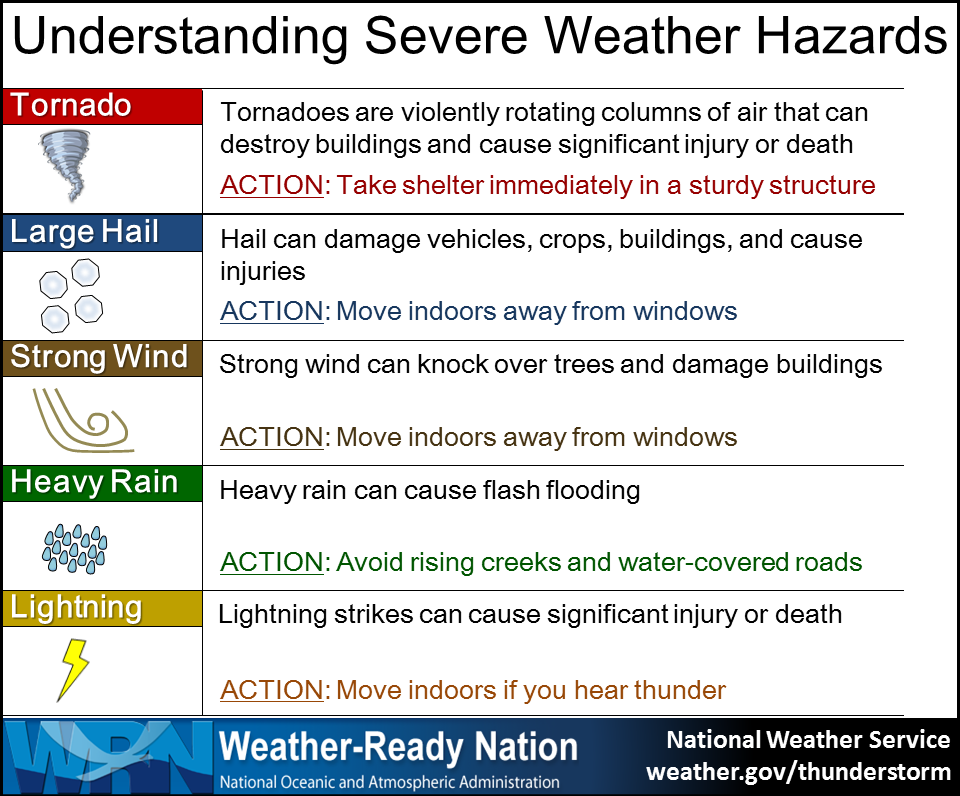Please help the National Weather Service spread these important safety messages on social media! Everyone is welcome to use the text and images provided below to help the NWS build a Weather-Ready Nation.
Facebook
A severe thunderstorm WATCH means BE PREPARED. When there is a severe thunderstorm watch pay extra close attention to the weather and be ready to act. Strong, damaging winds and large hail are possible. Preparing ahead of time helps save lives! http://www.nws.noaa.gov/om/thunderstorm/ww.shtml #SpringSafety
Twitter
Watch means BE PREPARED. Preparation helps to save lives! http://www.nws.noaa.gov/om/thunderstorm/ww.shtml #SpringSafety

Facebook
A severe thunderstorm WARNING means TAKE ACTION. When there is a severe thunderstorm warning move inside a sturdy structure immediately and stay away from windows. Strong, damaging winds and large hail are occurring or will shortly. Take Action! Acting early helps save lives! http://www.nws.noaa.gov/om/thunderstorm/ww.shtml #SpringSafety
A thunderstorm WARNING means TAKE ACTION and seek shelter! http://www.nws.noaa.gov/om/thunderstorm/ww.shtml #SpringSafety

Facebook
Heading out for a day of fun on the lake? Watch out for thunderstorms! Make sure to check the forecast before heading out and have a portable radio in the boat to get the latest forecasts. If the skies turn threatening, head to shore! http://www.nws.noaa.gov/om/thunderstorm/ #SpringSafety
Twitter
Heading out for a day of fun on the lake? Watch out for thunderstorms! http://www.nws.noaa.gov/om/thunderstorm/ #SpringSafety
Facebook
Spending time outdoors? Watch out for thunderstorms! Be aware of the forecast before you head out, and know how you will receive a thunderstorm warning if one is issued. Identify where the nearest shelter is located, and if the skies turn threatening, seek shelter immediately. http://www.nws.noaa.gov/om/thunderstorm/ #SpringSafety
Twitter
Spending time outdoors? Watch out for thunderstorms! http://www.nws.noaa.gov/om/thunderstorm/ #SpringSafety

Facebook
Thunderstorms can produce heavy rain, which can lead to flooding. Watch out for water of an unknown depth, it only takes 6 inches of flowing water to knock over a person, and 12 inches to carry away a car. If you can’t see the road, Turn Around Don’t Drown! http://www.nws.noaa.gov/om/thunderstorm/ #SpringSafety
Twitter
Thunderstorms can lead to flooding. Never drive through flood waters. https://www.nws.noaa.gov/om/thunderstorm/ #SpringSafety

Facebook
Thunderstorms can be a mariner’s worst nightmare. They can develop quickly and can produce strong winds, pounding rain and deadly lightning. If you see clouds beginning to pile up, thunderstorms are likely beginning to develop. Don’t wait until you can hear thunder or see lightning. It is best to head to port or safe shelter at the first sign of a developing storm. http://www.nws.noaa.gov/os/marine/safeboating/during.shtml #SpringSafety
Twitter
Boaters: When storms start to form, head to port or safe shelter immediately! http://www.nws.noaa.gov/os/marine/safeboating/during.shtml #SpringSafety

Facebook
A severe thunderstorm WATCH means BE PREPARED. A severe thunderstorm WARNING means TAKE ACTION. If there is a severe thunderstorm watch, stay informed and be ready to act, because severe thunderstorms are possible. If there is a severe thunderstorm warning, take shelter in a strong building, and get out of mobile homes that can blow over in high winds. Severe weather is occurring or will shortly. http://www.nws.noaa.gov/om/thunderstorm/ww.shtml #SpringSafety
Twitter
Watch means BE PREPARED. Warning means TAKE ACTION.http://www.nws.noaa.gov/om/thunderstorm/ww.shtml #SpringSafety

Facebook
Going camping? Watch out for thunderstorms! Know your weather forecast, and notify your family or friends of your plans. Have an evacuation plan, and know where you can find shelter. Make sure to pack a safety kit and a radio for forecast updates. http://www.nws.noaa.gov/om/thunderstorm/ #SpringSafety
Twitter
Going camping? Watch out for thunderstorms! http://www.nws.noaa.gov/om/thunderstorm/ #SpringSafety

Facebook
Know your risk for severe weather? See the Storm Prediction Center @NWSSPChttp://www.spc.noaa.gov #SpringSafety
Twitter
Know your risk for severe weather? See the Storm Prediction Center @NWSSPChttp://www.spc.noaa.gov #SpringSafety

Facebook
Tornadoes, large hail, strong winds, heavy rain, and lightning are all hazards associated with severe weather. Severe weather has been reported in all 50 states, so no matter where you are, make sure you are prepared! http://www.nws.noaa.gov/os/thunderstorm/ #SpringSafety
Twitter
Severe weather can occur anywhere. Wherever you are, be prepared! http://www.nws.noaa.gov/os/thunderstorm/ #SpringSafety

Facebook
It’s important to have a disaster supply kit ready in case of thunderstorms. Pack food and water, a battery powered radio, flashlights and batteries, a cell phone with a spare battery pack, a first aid kit, a pair of shoes, a list of emergency contacts, and a whistle to signal for help. http://www.nws.noaa.gov/os/thunderstorm/ #SpringSafety
Twitter
It’s important to have a disaster supply kit ready in case of thunderstorms. http://www.nws.noaa.gov/os/thunderstorm/ #SpringSafety

Facebook
Severe thunderstorms can produce damaging hail! The largest hail stone recorded in the US measured 7.9 inches, and a 3 inch hailstone can fall to the ground as fast as 107 mph. Find shelter, stay indoors, and stay away from windows. http://www.nws.noaa.gov/os/thunderstorm/ #SpringSafety
Twitter
Severe thunderstorms can produce damaging hail! http://www.nws.noaa.gov/os/thunderstorm/ #SpringSafety

Facebook
Severe thunderstorms can produce damaging hail! The largest hail stone recorded in the US measured 7.9 inches, and a 3 inch hailstone can fall to the ground as fast as 107 mph. Find shelter, stay indoors, and stay away from windows. http://www.nws.noaa.gov/os/thunderstorm/ #SpringSafety
Twitter
Severe thunderstorms can produce damaging hail! http://www.nws.noaa.gov/os/thunderstorm/ #SpringSafety

Facebook
Straight line winds in severe thunderstorms can exceed 100 mph and cause the same amount of damage as a tornado. Squall lines, which are known for producing very strong winds, are common during the fall. When a severe thunderstorm warning is issued, seek shelter in a sturdy building. Mobile homes are not safe during a severe thunderstorm. http://www.nws.noaa.gov/om/wind/thunderstorms_derecho.shtml #SpringSafety
Twitter
Straight line winds in severe thunderstorms can exceed 100 mph and cause the same amount of damage as a tornado. http://www.nws.noaa.gov/om/wind/thunderstorms_derecho.shtml
